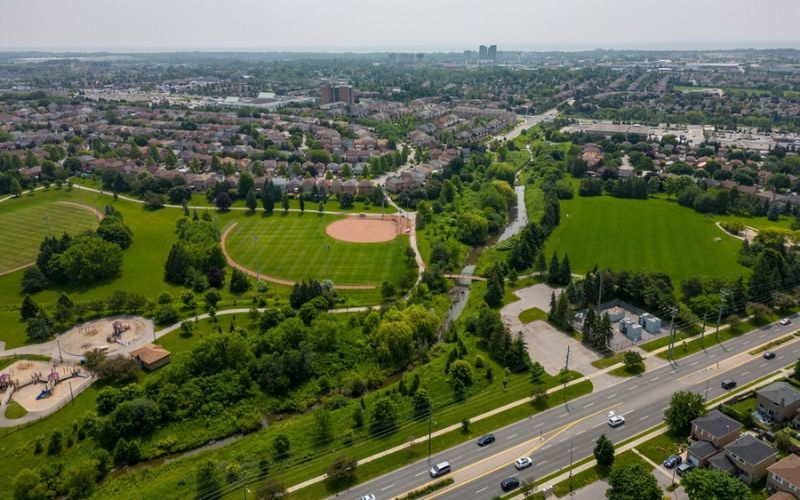Jan 7
Guide for Non-Residents Buying Property in Ontario
Ontario’s real estate market has become a magnet for international investors seeking to tap into one of the most lucrative and fast-evolving markets in Canada. However, recent legal changes have made the process more complex for non-residents. If you’re looking to navigate the challenges of purchasing property in Ontario, this guide will equip you with the crucial information to make smart decisions and grow your investments. From eligibility and taxes to financing and legal considerations, this guide covers everything you need to know.
Eligibility To Purchase Property In Ontario
While non-residents can still purchase property in Ontario, the introduction of the Prohibition on the Purchase of Residential Property by Non-Canadians Act in 2023 has significantly altered the landscape. This federal law introduced a two-year ban on foreign nationals buying residential properties in order to cool the housing market and reduce speculation. The ban is due to be extended until 2027.

There are several important exemptions to this Prohibition, including:
- Permanent residents of Canada
- Spouses of Canadian citizens or permanent residents
- Temporary residents with valid work permits
- Refugees and certain international students
If you fall into one of these categories, you can still purchase property without restriction. If not, non-Canadians are generally prohibited from buying residential property until the ban is lifted.
Non-Resident Speculation Tax (NRST)
For foreign investors who are eligible to purchase property in Ontario, the Non-Resident Speculation Tax (NRST) is a crucial consideration. The NRST is a 25% tax on the purchase price of residential properties, designed to curb speculative investments and alleviate pressure on Ontario's housing market.
It’s important to note that the NRST is separate from the general Land Transfer Tax (LTT) and applies only to designated lands with up to six single-family homes.
It’s important to note that the NRST is separate from the general Land Transfer Tax (LTT) and applies only to designated lands with up to six single-family homes.
Here are the key points to understand:
- Rate: The NRST is pegged at 25% of the purchase price.
- Scope: It covers properties up to six single-family homes.
- Exemptions: Trustees of particular trusts, protected persons, nominees under specific schemes, and foreign nationals who would become permanent residents within four years.
- Additional Measures: These are part of greater government steps towards controlling foreign real estate investment.
Financing Options For Non-Residents In Ontario

While the legal and financial requirements for purchasing property in Ontario as a non-resident may seem intimidating, understanding the general process can simplify things significantly. In addition to navigating legal steps, such as the 25% Non-Resident Speculation Tax (NRST), foreign nationals and corporations must also consider these factors when planning their finances.
Here are the key points to keep in mind:
Here are the key points to keep in mind:
- Down Payment: Non-residents are typically required to make a down payment of at least 35% when obtaining a mortgage in Ontario.
- Bank Account Requirement: Canadian banks require that the down payment funds be held in a local bank account in the applicant’s name for at least 30 days prior to closing.
- Alternative Financing: Non-residents should consider various financing strategies, whether through large down payments or exploring alternative funding options.
- Consult Mortgage Brokers: It's advisable to work with mortgage brokers experienced with foreign buyers, as they can offer guidance and help navigate the process efficiently.
Investment Potential In Ontario's Real Estate Market
Despite increased restrictions, Ontario's real estate market remains a promising investment opportunity. Cities like Toronto and Ottawa continue to experience rapid growth due to high demand for housing, even with the introduction of the Non-Resident Speculation Tax (NRST) and other limitations for foreign buyers. While challenges exist, the potential for long-term returns is strong as property values continue to appreciate.
That said, entering this market requires a comprehensive investment strategy. Successful investors should include financial forecasting, risk assessment, and asset management in their planning. With the right guidance and an understanding of the regulatory landscape, Ontario's real estate market can still offer significant profit opportunities.
Steps For Non-Residents To Buy Property In Ontario

Ontario's stunning cities and landscapes, combined with its high standard of living, make it a sought-after destination for property buyers worldwide. While the process of buying property as a non-resident can seem complex, it’s manageable with the right steps and preparation.
To help simplify things, here is a step-by-step guide for foreign buyers looking to navigate the property-buying process in Ontario.
1. Research the Market
Before making any property investment, it’s crucial to thoroughly research the Ontario real estate market. This means understanding the availability of properties, the best areas to invest in, prevailing price trends, and other economic factors that can impact your decision.
It’s not just about the current market conditions, but also long-term trends that could affect property values. Be mindful that some neighborhoods may have specific regulations or higher prices that could limit your options. Additionally, keep an eye on emerging developments that may drive property prices up in the near future.
2. Secure Your Financing Like a Pro
Financing for non-residents differs significantly from that for local buyers, but Canadian banks do offer funding options. Non-residents typically need a larger down payment—often around 35% of the property’s purchase price. Lenders will also require key documentation, including proof of income, employment history, and credit information from your home country.
Starting the financing process early is essential, as cross-border banking regulations and procedures may take longer than expected. While some buyers may turn to private lenders as an alternative, it’s important to note that private loans often come with higher interest rates. Overall, non-resident buyers should anticipate a more detailed review process compared to local buyers. Planning ahead will help ensure smoother financing and timely property acquisition.
3. Partner with a Real Estate Agent Who Gets You
Buying property as a non-resident can feel overwhelming, but the right real estate agent can make all the difference. Look for someone who has experience helping non-resident buyers navigate the market. They’ll not only help you find the ideal property but also guide you through negotiations and explain any local rules or regulations that apply to you.
A good agent will flag potential hidden costs, like homeowner association fees or maintenance dues, so there are no surprises later. Be open about your needs, budget, and timeline—especially if you're managing things from abroad. Their local knowledge and expertise will make the entire process less stressful and much more manageable.
4. Learn About Non-Resident Taxes
Taxes are an important part of buying property as a non-resident, and being aware of them upfront can save you from unexpected surprises later. As mentioned above, one major tax to understand is the Non-Resident Speculation Tax (NRST). This is a 25% tax on the purchase price of residential properties in Ontario, particularly in the Greater Golden Horseshoe region.
Knowing how these taxes impact your investment is crucial for effective financial planning. Additionally, depending on your circumstances, you may qualify for rebates or exemptions, such as if you become a permanent resident within a specific timeframe.
To make sense of the tax system and ensure you're not leaving money on the table, consider working with a tax professional experienced in non-resident property transactions. Their guidance can help you navigate the complexities and make smarter decisions for your investment.
Knowing how these taxes impact your investment is crucial for effective financial planning. Additionally, depending on your circumstances, you may qualify for rebates or exemptions, such as if you become a permanent resident within a specific timeframe.
To make sense of the tax system and ensure you're not leaving money on the table, consider working with a tax professional experienced in non-resident property transactions. Their guidance can help you navigate the complexities and make smarter decisions for your investment.
5. Enlist a Savvy Canadian Lawyer
Ontario law requires buyers to retain a real estate lawyer for property transactions. For non-residents, it’s especially important to find a lawyer who has experience with international transactions.
Your lawyer will play a pivotal role in handling essential legal tasks such as reviewing the purchase agreement, conducting title searches, and ensuring all documentation complies with Ontario’s property laws. They’ll also guide you through any specific legal obligations or requirements that apply to non-resident buyers, helping you avoid potential pitfalls.
Having a responsive lawyer who understands the unique challenges faced by international clients can make all the difference in ensuring a smooth transaction. Choose someone who can clearly explain your responsibilities under Canadian property laws and provide ongoing support throughout the buying process.
Your lawyer will play a pivotal role in handling essential legal tasks such as reviewing the purchase agreement, conducting title searches, and ensuring all documentation complies with Ontario’s property laws. They’ll also guide you through any specific legal obligations or requirements that apply to non-resident buyers, helping you avoid potential pitfalls.
Having a responsive lawyer who understands the unique challenges faced by international clients can make all the difference in ensuring a smooth transaction. Choose someone who can clearly explain your responsibilities under Canadian property laws and provide ongoing support throughout the buying process.
6. Make An Offer and Negotiate
Once you’ve found the property that feels like the right fit, it’s time to make an offer. Your real estate agent will guide you through drafting the offer and help negotiate the price with the seller. Keep in mind, the Ontario real estate market can be quite competitive, so negotiations are often part of the process.
If you're securing funding from abroad, fluctuations in the exchange rate could impact the final price, so be prepared for that. Additionally, some sellers may request proof of funding to ensure the sale goes smoothly, especially when dealing with international buyers.
7. Lock in Robust Home Insurance
Before closing your deal, securing home insurance is a necessary step. Most lenders will require proof of insurance coverage before they release mortgage funds. Take the time to shop around and compare policies from different providers to find the best coverage at a reasonable price.
Depending on the location of your property, you might need to add extra coverage for things like flood zones or extreme weather risks. If you plan to rent out the property or leave it vacant for a while, make sure your insurance covers those scenarios as well. Having the right insurance in place helps protect your investment from unexpected damage.
8. Seal the Deal (Closing Time)
The final step is closing the deal. While your lawyer will handle most of the paperwork and legal tasks, you’ll need to be prepared for closing costs, which can include land transfer taxes, lawyer’s fees, and any outstanding down payments or taxes. It’s important to understand these costs upfront, as they can add up quickly.
Once everything is settled, the property title will be transferred to your name, and you’ll receive the keys to your new place in Ontario. If you're not in the country during the closing, you can authorize your lawyer to handle everything on your behalf. Some advance planning is required to ensure everything goes smoothly, especially if you're not able to be there in person.
Once everything is settled, the property title will be transferred to your name, and you’ll receive the keys to your new place in Ontario. If you're not in the country during the closing, you can authorize your lawyer to handle everything on your behalf. Some advance planning is required to ensure everything goes smoothly, especially if you're not able to be there in person.
9. Arrange Reliable Property Management
If you don’t plan to live in the property full-time, it's important to set up property management. You can hire a professional property management company to take care of day-to-day tasks like managing tenants, handling maintenance, and addressing any issues that come up.
A good management company ensures that rent is collected on time, the property stays in good condition, and any problems are dealt with quickly. Be sure to factor in management fees when calculating your rental income or return on investment. If you’ll be absent for long periods, having a trusted management company to handle tenant inquiries, repairs, and inspections is key to keeping everything running smoothly.
Set Yourself Up for Success as a Non-Resident Investor in Ontario
Purchasing property in Ontario as a b may seem complex, but with the right guidance and strategic planning, it’s completely achievable. By understanding the legal landscape, securing your financing, and partnering with the right professionals, you can navigate the challenges and unlock the full potential of Ontario's real estate market.
Whether you’re a seasoned investor or new to the Canadian market, following the outlined steps will ensure you make informed decisions and set yourself up for success. Start researching today, and make the first step toward growing your real estate portfolio in one of Canada's most thriving markets.
Frequently Asked Questions
Can I Purchase a House in Canada if I Am Not a Resident?
Yes, non-residents can buy property in Canada. However, there are specific legal requirements, such as a 35% minimum down payment for non-resident buyers. While there are additional taxes and regulations, investing in Canadian real estate can still be a lucrative opportunity for international buyers.
What documents do I need while applying for a mortgage in Canada as a non-resident?
Non-resident buyers will need to provide several key documents to apply for a mortgage in Canada. These typically include:
- Proof of income (such as employment contracts, tax returns, or pay stubs).
- Documentation of the down payment (e.g., bank statements showing funds held for at least 30 days).
- A reference letter from a bank, preferably a Canadian bank.
- An international credit report or six months of bank statements.
COACHING
Service is at the heart of everything we do at Strategic Success Consulting. You'll experience the difference when you talk to our associates, and you'll see the difference that exceptional makes in your learning journey. Book a Discovery Call for more information!
COURSES
We offer Strategies, Courses, Modules and Deep Dives to help support you throughout your business or real estate investing journey.
EVENTS
Come check out our Strategic Entrepreneur Networking events in person or online! We also host webinars, workshops and other events that you can find on our events calendar!
ABOUT US
At Strategic Success Consulting we uphold an ongoing commitment to providing an elevated level of personal service. Our clients come first, and as a result, they are able to achieve more than they ever dreamed with their business and/or real estate investing.
Copyright © 2024 Strategic Success Consulting Inc. All rights reserved.
